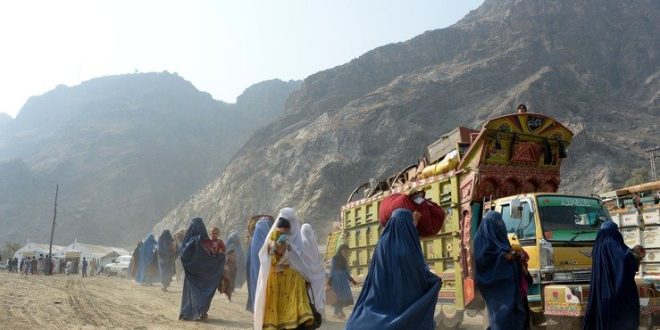AT News
KABUL – The United Nations refugee agency has issued a dire warning, expressing concerns over potential Afghan casualties during a harsh winter exodus from Pakistan. Nearly half a million Afghans have left Pakistan since early October, following the government’s announcement to arrest and deport foreigners deemed to be in the country illegally. While Islamabad maintains that the policy is not nationality-specific, the majority affected are Afghan nationals.
The forced returns are creating immense pressure on Afghanistan and aid organizations responsible for essential services like healthcare. As freezing temperatures grip the region, conditions at the border remain grim. The UN refugee agency, in a report published on Friday, emphasized the vulnerability of many Afghan returnees, particularly women and children, who could face life-threatening situations without adequate shelter.
With families arriving at the border in an exhausted state, urgent assistance and psychosocial support are deemed essential. Concerns have been raised about colder winter temperatures in certain areas, such as mountainous regions, preventing immediate returns home. The agency revealed that returnees are arriving with illnesses like bronchitis due to the harsh weather and challenging journey from Pakistan. Some lack essential belongings, including clothing, to protect themselves from the elements.
Among those returning to Afghanistan are families that have never lived in the country, having spent one or more generations in Pakistan. These families may not have homes or extended family to return to, requiring cash for rent. The agency pledged to provide tents for households needing shelter. Families with existing social networks may stay with relatives or friends, while others could face the challenge of returning to homes in need of repair.
In response to the situation, a Taliban committee announced the distribution of essential items at key border crossings, including food, water, SIM cards, clothing, and cash. However, extreme temperatures and limited access to clean water and sanitation have led to a surge in infectious diseases and malnutrition.
U.N. Women highlighted additional challenges for Afghan women and girls leaving Pakistan, as they may encounter Taliban restrictions affecting mobility and access to information and services without a male relative. The agency reported that approximately 80% of Afghans returning through Torkham and Spin Boldak are women and children. Many women have experienced distressing situations in Pakistan, including illegal detention, witnessing family members’ arrests, or returning to Afghanistan alone.
The UN refugee agency’s latest report, published on Friday, sheds light on the hardships faced by women compelled to surrender their possessions for transportation or leave belongings behind due to the crackdown, drawing condemnation from rights groups, the Taliban, aid agencies, and the United Nations.Top of Form
 Afghanistan Times
Afghanistan Times




